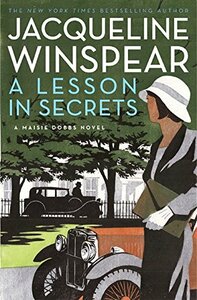Take a photo of a barcode or cover
It makes me sad to give this book two stars because I love this series and have enjoyed most of the other books. One of the things I admire about Winspear is her ability to weave stories of WWI and interwar Britain into her Maisie Dobbs novels without sacrificing the story. But in this book, the main plots involve the growing spectre of Nazism and the long shadows of a World War I mutiny, and the historical detail just overwhelms the storytelling. The subplot about organized crime did not dovetail smoothly with the rest of the book. Even if you like this series, you can skip this one, as it does not advance the ongoing stories of the characters in any significant way. I could summarize that part for you in a paragraph.
Though Maisie's success in love and work and her new personal wealth are well-deserved, I fear that she may become less interesting as a main character. Her appeal as a heroine was in her struggle to overcome poverty and war to become an independent working woman between the wars in 20th century London. Our talented heroine's hard work has reaped huge rewards. Still, her elevated station in life means there's a loss of tension in the plots and subplots. There is also increased alignment between Maisie's work, intelligence-gathering for the government, which decreases the level of suspense of the plot, since the stories lie close to well-known settings. I didn't like Maisie's new-found reliance on lying as a way to get information from people. And I fear for the future of her friend Priscilla's three boys. This book is like meeting a close friend who has moved away and reached a high level of career success--one wonders if the friendship will last now that her life is so different.
I read the first Masie Dobbs book shortly after it came out. I read the next couple when they cam out and then, although I enjoyed the series very much, I lost track of it.
I won this book (#8) from Good Reads First Reads and I decided to read it right away, even though I'd read the first few years ago and hadn't read the ones in between. BTW, this is a complete departure from my usual obsessive reading of a series which has to start at the beginning and go in order, but that's another story. I decided that reading the book "out of order" as it were, would be a way to see if it would stand on its own. A book, even a book in a series, should be able to do that, although, obviously, a grounding in the previous books should certainly enhance the experience.
So, that's a long introduction, what did I think? I liked it! It was a little slow to draw me in but draw me in it did. I like Masie a lot. She has lots of common sense and she's smart, but not so smart as to seem inhuman. I also like that there is much more than one storyline in the book. There is the main murder mystery, there is a new line of work Masie is getting into, there is a minor mystery involving a woman that had stayed with Masie in a previous book, there is a small story involving Masie's assistant Billy and finally there is some time spent on Masie's personal life too. Just like real life, always lots going on!
I don't normally do plot summaries but I will say that Masie goes to teach at a small college where the founder is later murdered. I had a little trouble, at first, keeping the different lecturers at the college straight but as each one was investigated by Masie, this passed. I really like how she investigates, it makes sense and you can follow her logic.
The story takes place prior to WW II and there is a lot of content in the book regarding the politics of the time and the rise of Adolph Hitler in Germany.
In conclusion, this is an excellent historical mystery. It feels real, I didn't guess "whodunnit" (although I almost never do), I cared about the characters and I want to read what happens next (in the next book). Highly recommended.
I won this book (#8) from Good Reads First Reads and I decided to read it right away, even though I'd read the first few years ago and hadn't read the ones in between. BTW, this is a complete departure from my usual obsessive reading of a series which has to start at the beginning and go in order, but that's another story. I decided that reading the book "out of order" as it were, would be a way to see if it would stand on its own. A book, even a book in a series, should be able to do that, although, obviously, a grounding in the previous books should certainly enhance the experience.
So, that's a long introduction, what did I think? I liked it! It was a little slow to draw me in but draw me in it did. I like Masie a lot. She has lots of common sense and she's smart, but not so smart as to seem inhuman. I also like that there is much more than one storyline in the book. There is the main murder mystery, there is a new line of work Masie is getting into, there is a minor mystery involving a woman that had stayed with Masie in a previous book, there is a small story involving Masie's assistant Billy and finally there is some time spent on Masie's personal life too. Just like real life, always lots going on!
I don't normally do plot summaries but I will say that Masie goes to teach at a small college where the founder is later murdered. I had a little trouble, at first, keeping the different lecturers at the college straight but as each one was investigated by Masie, this passed. I really like how she investigates, it makes sense and you can follow her logic.
The story takes place prior to WW II and there is a lot of content in the book regarding the politics of the time and the rise of Adolph Hitler in Germany.
In conclusion, this is an excellent historical mystery. It feels real, I didn't guess "whodunnit" (although I almost never do), I cared about the characters and I want to read what happens next (in the next book). Highly recommended.
Maisie works for the secret service and goes undercover as a philosophy professor. Mayhem ensues as the nazi party begins to rear it's head. A great Maisie read.
Probably my least favorite of my recent Maisie Dobbs mysteries. I felt the book had too many story lines--lines that distracted from the main plot rather than added to it. Also, I felt that Maisie was rather passive in this book. Being acted upon rather than doing the acting.
It's weird to read about the rise of the Nazis when your own country is flooded with awful rhetoric about religious minorities. (Also trying to do the math to see what characters' children will have to go to war.)
My mom recommended this mysteries series to me, and this is the 5th or 6th book about Maisie Dobbs. I liked it more than I expected--it could fall into the "cozy" mystery category except it's smarter than that. Maisie is a little too good to be true (smart, pretty, good-hearted, wealthy, enlightened, etc.), but I really liked her anyway and found myself more and more drawn into the story. This one takes place in 1932 England and deals with WW1 conscientious objectors. The whodunnit part was probably the least interesting tho' it was engaging enough, but I liked Maisie and her acquaintances and her world very much. I'll read more.
I didn't quite enjoy A Lesson in Secrets as much as the previous one - [b:The Mapping of Love and Death|6553733|The Mapping of Love and Death (Maisie Dobbs, #7)|Jacqueline Winspear|https://d.gr-assets.com/books/1329659691s/6553733.jpg|6746308]. The emotional pull wasn't really there, and the mystery storyline wasn't as enticing as "The Mapping" one I read earlier this year. This is surprising to me however, since A Lesson in Secrets takes place in an academic environment. I cherish those books that take place in a university setting normally. I'm wondering perhaps if it was because of listening to the audio version for this one. The Mapping one I owned in paperback and really enjoyed reading it that way. I listened to A Lesson in Secrets and while I do love Orlagh Cassidy's narration, I think I'm going to read the rest in the series (I own them all) instead of audio. I do own the next three in line to read so that I'll be caught up to the point for the newest in the series, [b:Journey to Munich|25776606|Journey to Munich (Maisie Dobbs, #12)|Jacqueline Winspear|https://d.gr-assets.com/books/1448215544s/25776606.jpg|45625869]. Because I do love my Maisie Dobbs!
I so love Maisie Dobbs, and this mystery certainly holds up to the rest of the series. Now that we're getting into the thirties, I have a better idea of the history and what is happening politically, so the hair went up on the back of my neck when I realized that certain of the young children would definitely be old enough to fight in WWII. Entering the realm of the secret service certainly fits with who Maisie is, and I loved that she wouldn't just be a pawn in the game.




